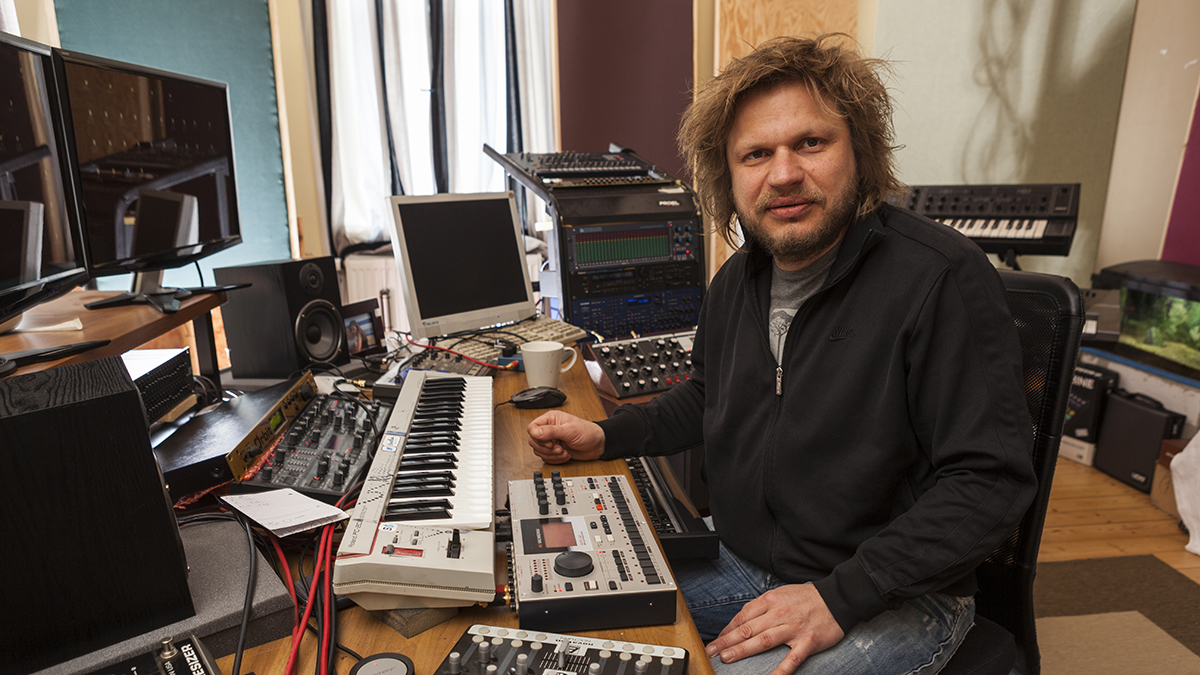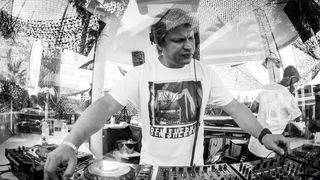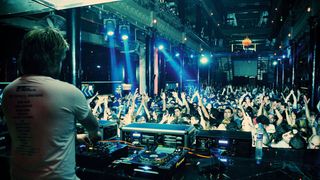Timo Maas on his love of music and remixing some serious A-listers
The house veteran discusses dream remixes, perfect studio partnerships and the importance of making music from the heart

"Music is my language; it's how I communicate with people and how I try to understand the world. Without it, I'd be lost."
German producer/DJ/remixer Timo Maas may have released his first single - the bustling and hectic Final XS - over 20 years ago, but those decades have neither dulled nor damaged his love of music. Whether he's talking about his recent hit remix of Paul McCartney and Wings' Nineteen Hundred and Eighty Five, or the chorus of birdsong in his back garden, Maas's enthusiasm is honest and infectious.
What was meant to be a quick tech and studio chat turns into a joyful, two-hour musical seminar. "Music isn't just about business; it's about shaping emotions… helping you through the dark times. When I put on Curtis Mayfield's Superfly, I don't think, 'Oh, I wonder how many copies he sold'; I think, 'Hey, I've got a smile on my face and life is great!'
Despite the philosophical detours, that Wings remix is supposed to be the topic of conversation. Treated to a loping, house once-over by Maas and his current production partner James Teej, it was initially given a limited white-label release, but caused such a stir that copies were soon changing hands for 300 quid! Of course, the Beatle rumour-mill was in full-effect, with reports that the remix was the work of McCartney himself - or even Kanye West - but all was revealed when Virgin signed the single for a worldwide release.
We take it that Sir Paul has given you his blessing. If not, chances are you'll be getting a letter from his very expensive lawyer!
"Ha ha! Absolutely. We got a message from him saying that he liked the track, which, I have to say, was one of the greatest days of my life. Wow! We got a message from Paul McCartney and he listened to one of our tracks! That really is one of those stories I'll be able impress my grandchildren with.
"But the story goes back much further… all the way back to 2009. Me and my agent, David Levy, were having a listening session in Ibiza; playing each other different tracks that we liked. I heard the original and just went, 'What the fuck is that? It sounds like crazy house music sung by Paul McCartney'. David told me that it was from Wings' 1973 album Band on the Run.
Get the MusicRadar Newsletter
Want all the hottest music and gear news, reviews, deals, features and more, direct to your inbox? Sign up here.
"Thinking out loud, I said, 'Man, I would love to get hold of the stems for that', and David blew me away by explaining that he knew McCartney's management team and would make some enquiries. A week later, the complete studio session for that track arrived on my desk - not just the finished track, but the entire session! I sat there listening to this stuff, feeling like I was the luckiest guy in the whole world."
That was back in 2009; how come it's only just been released?
"Believe me, remixing someone like Paul McCartney isn't easy. You're aware of all the history and how much his music means to so many people, which creates a little bit of pressure. But hey, I don't mind a bit of pressure. I wanted to somehow give this song a modern setting and perhaps introduce it to a different audience, while still remaining respectful to the original.
"Over the next few months, I tried working on it with several different people, but never seemed to be able to find what I was after. That was around the same time as I had a few personal issues happening in my life and… well, I guess it just went back on the shelf and I forgot about it.
"Several years later, I happened to be enjoying an evening of fine wine with James [Teej] at my house and, somehow, I pulled the McCartney song up on the computer. He had exactly the same reaction as me… 'What the fuck is this?'. I played him some of the original studio tracks and he said, 'Dude, we have to do something with this'.
"In some ways, the fact that the song had been forgotten about was quite good, because nobody was hassling us; we could work on the song and create something that was coming from our hearts. It was almost as if we were remixing the song for fun. Anyway, we eventually sent it off to Sir Paul and they said, 'OK, how do we proceed with this?'.
In some ways, the fact that the song had been forgotten about was quite good, because nobody was hassling us; we could work on the song and create something that was coming from our hearts.
"Up until that point, I had no idea what was going to happen to the song or even if it would get released, but the fact that he liked it immediately opened up a whole load of new doors for us. We sent it out and people went crazy!"
You've remixed some big names over the years - Depeche Mode, Madonna, Muse, Jamiroquai… is there a different set of rules when you're remixing an A-lister?
"Remixing your heroes can give you some headaches. I remember when me and Martin Buttrich [Maas' production collaborator for over ten years] were working on Depeche Mode's Enjoy the Silence and I was thinking, 'Shit, this is one of the most influential bands in the world'. But after that initial panic, the process is quite similar: you get into your musical bubble and try to dive right into the heart of the song."
The Wings remix certainly takes the song in a very different direction. Should every remix do that?
TM: "For me, yes, one of the most important issues is that you have to take the song somewhere new. I'm not saying you try and create a different song, but you have to try and introduce that song to a different audience. Isn't that why people first started remixing? It allowed you to take a rock track into the clubs… a club track to a rock audience. A remix has to be more than just a 'different' version.
"Earlier this year, I had the honour of remixing Jean Michel Jarre for his new album, and that was probably one of the most difficult jobs I've ever done. Basically, he was the guy who introduced me to electronic music! Those early albums, Oxygène, Équinoxe and Magnetic Fields… I must have been about 12 or 13 years old, and suddenly this incredible musical world was flashing before my eyes.
"I did get to meet him and, of course, the only thing I could say was, 'Without you, I wouldn't be here'. He must have heard that a million times, but he was still very gracious."

That's when you discovered music was your 'language'?
"No, that came much earlier. Probably seven or eight. Look, the truth is that I came from a pretty poor background, and childhood wasn't so easy for me. I was a shy kid… introverted. Socially, I was cut-off from most of the kids in my neighbourhood and, even if one of them talked to me, I didn't know what the hell to say.
"My connection with the world was my radio. I used to sit in my room, taping songs and then listening to them over and over. It was a very simple pastime, but it made me so happy. I heard the chord changes and these different melody lines, and it all made sense to me. Then, to my surprise, I found that when I talked about music, other kids would talk to me. That was how I related to people. Not through football or a new pair of trainers… through music."
Were you interested in 'playing' music?
"Not really. At first, I just wanted to discover more and more new music. That wasn't easy! I grew up in a very small town and the local record store also sold bicycles and sewing machines. When I went in there to order my Jean Michel Jarre album, it would take weeks or even months to arrive. But I was a patient kid. I was willing to wait because I knew that I was waiting for something very special.
"After a while, I didn't just want to discover all this music for myself, I decided it was time for other people to hear it too. So, yes… I became a DJ!
"What you have to remember is that, back when I was 15 years old, being a DJ was not cool; in fact, it was the opposite of cool."
It was all about weddings and school discos!
"You got it! A DJ was always the most annoying guy at the party; people hated the DJ. But I didn't care - I was happy to stand on the opposite side to everyone else because I loved the music so much.
"Of course, this story does have a happy ending: as the 80s continued, the DJ was no longer the guy you hated - he became the cool guy. For years I'd been on the outside, but suddenly people were saying, 'Hey, Timo, this music is great. What is it?'
"Music had substance, and every time I played a song, it meant something to me. Something I felt deep down in my soul. And that feeling has stayed with me right up until today."
So what was your first actual piece of electronic music making studio gear?
"Look… it's no secret. I'm not the world's greatest studio technician. For the whole time that I've been making records, I've always worked with a producer - currently, it's James Teej, but for many years it was Martin Buttrich.
"What equipment did I buy? After I started having a bit of success with Martin, we invested almost everything back into the music and the studio… samplers, synthesisers, effects. This was back in the hardware days and the prices were pretty scary. Thousands of German Marks for one synthesiser or sampler.
"I never wanted a studio of my own because I very quickly realised that technical knowledge wasn't my strong point. I understand what is possible in the studio and I understand how I want my music to sound, but I work with people who can do those things way faster than I can."
These days, you must have a 'studio'…
"Even today, I only have what you would call a production setup - just a Mac running Logic. I work on Logic because Martin worked on Logic and I spent many hours looking over his shoulder. I'm not an expert, but I can put together beats, basslines and ideas; I can do what I need to do.
"When it comes to taking an idea to the next stage, there's a local guy I work with who's brilliant in the studio; then there's Martin and, of course, James. He's an amazing guy to work with because he's so open-minded and flexible."
Even today, I only have what you would call a production setup - just a Mac running Logic. I'm not an expert, but I can put together beats, basslines and ideas; I can do what I need to do.
Have you ever wished you were a bit more technical?
"I occasionally go through phases, but then I realise just how long it would take me to learn all this stuff. No matter how hard I study, I'm never going to be as good as Martin or James or any of the other producers I've worked with.
"My technical work is… a lot of the time, I would simply describe it as talking. I'm a 'viber'. I love searching for samples and taking my field recorder out into the world. I love doing live sessions with musicians, connecting what they're doing with the ideas in my head.
"There is more to music than being a great technician. I know this because I've met genius technical guys with monster studios and they've never released a thing. They have the equipment, but no songs. They have walls and walls of the best equipment money can buy, but it can't create anything without
an idea."

And if you did turn into one of those guys with a monster studio…
"Maybe the ideas would stop. Maybe it would destroy my connection with the music. I've been making music for almost half of my life and it's worked out pretty good for me. Why would I risk that? It would be crazy!
"I know that I always talk too much, but can I just tell you one more story? Recently, I was invited to a conference in Switzerland on the future of music. There were maybe 20 people in the room and they were all way more important than me… people like Giorgio Moroder, Jean Michel Jarre, Andy Fletcher
from Depeche Mode…
"As part of that conference, we all had to make a speech, and my speech was right at the end of the last day. All the other people made their speeches and I thought, 'Oh, shit!'. The subjects I wanted to talk about had already been covered. Spotify… new ways to market your music… changes to the way the music business works. There was nothing left for me to say!
"Then I said, 'Timo, it's simple', and I based my speech on all the things I've just told you. We are living in a fantastic technological era where you can create great-sounding music with nothing more than your mobile phone. Pressing the right button is easy, but making a great song involves much more than installing the right App or pressing the right button. To me, music is about discovering and expressing beauty; it is about that crazy moment when the goosebumps take over your whole body.
"In this technical age, we shouldn't forget that all music starts with something very human: it starts with an idea."
Nineteen Hundred and Eighty Five, Timo Maas and James Teej's remix of Paul McCartney & Wings is out now on Virgin Records.


Computer Music magazine is the world’s best selling publication dedicated solely to making great music with your Mac or PC computer. Each issue it brings its lucky readers the best in cutting-edge tutorials, need-to-know, expert software reviews and even all the tools you actually need to make great music today, courtesy of our legendary CM Plugin Suite.
Most Popular








